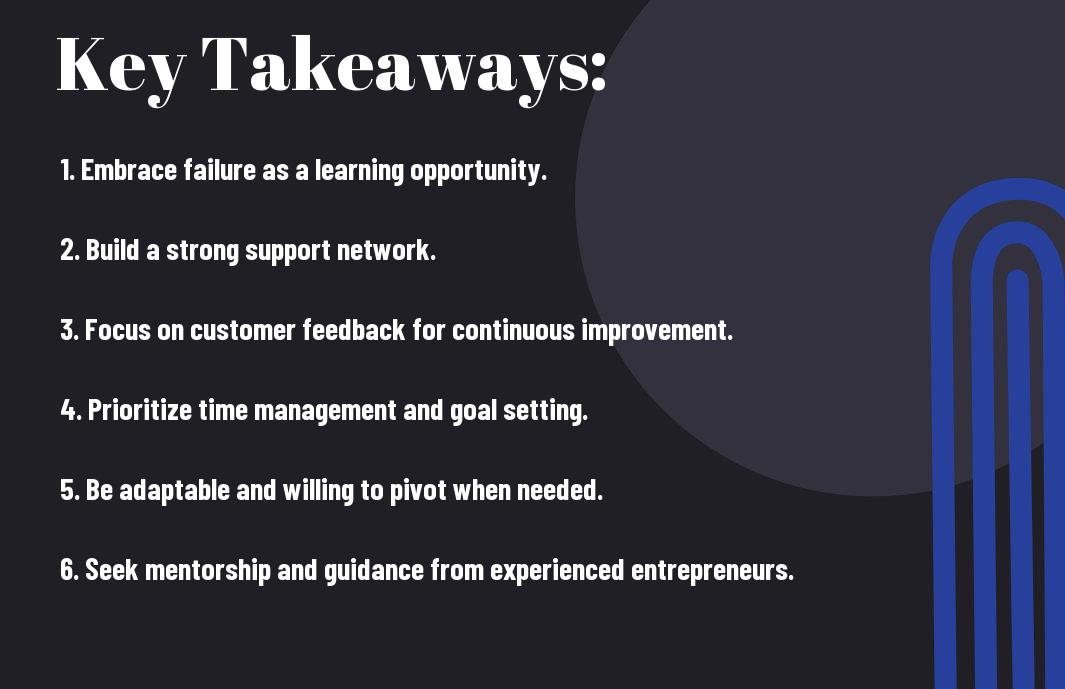Many aspiring entrepreneurs face a myriad of obstacles when initiateing on their business journey, from securing funding to building a customer base. In this informative blog post, we will explore key strategies to overcome some of the most common challenges that startups encounter. By addressing critical issues such as financial constraints, market saturation, and limited resources, entrepreneurs can pave the way for success in the competitive world of business. Stay tuned as we explore into effective tactics and proven methods to navigate the ups and downs of launching a startup and emerge victorious.

Developing a Solid Business Plan
Market Research and Analysis
The key to a successful business lies in thorough market research and analysis. Understanding the needs and preferences of your target market, identifying your competitors, and assessing industry trends are crucial steps in creating a strategic business plan.
Defining Clear Business Objectives
On the path to success, defining clear business objectives acts as your guiding light. These objectives should be SMART (Specific, Measurable, Achievable, Relevant, and Time-bound) to provide a clear direction for your business and help you measure progress effectively.
Defining specific and measurable goals helps you stay focused and motivated towards achieving them. Clarity in objectives also assists in communicating your vision to stakeholders and team members, ensuring everyone is aligned towards the same outcome.
Securing Adequate Funding
Exploring Various Funding Options
Nowadays, securing adequate funding is crucial for the success of any startup. It’s important to explore various funding options to find the right fit for your business. This could include bootstrapping, seeking investors, applying for loans, or crowdfunding. Each option has its pros and cons, so it’s important to evaluate them carefully before making a decision.
Effective Financial Management Strategies
To ensure the long-term success of your startup, effective financial management is key. Adequate cash flow management, budgeting, and monitoring expenses are important components of this strategy. By implementing smart financial practices from the start, you can avoid cash flow issues and make informed decisions about the future of your business.
Various resources, such as accounting software and financial advisors, can also be valuable in helping you manage your finances effectively. Regular financial reviews and forecasts will enable you to stay on track and make adjustments as needed to maintain financial stability.
Building a Strong Team
Hiring the Right Talent
Many startups face the challenge of hiring the right talent to build a successful team. It is necessary to hire individuals who not only possess the required skills and experience but also align with the company’s values and culture. Strong communication skills, adaptability, and a passion for the company’s mission are crucial traits to look for in potential team members.
Fostering a Culture of Collaboration and Innovation
Many startups struggle to foster a culture of collaboration and innovation due to a lack of clear communication and siloed departments. Culture plays a significant role in shaping how team members interact and work together. By promoting an open-door policy, encouraging idea-sharing, and celebrating both successes and failures, startups can create a collaborative environment that fuels innovation.
Collaboration is key to overcoming challenges and driving growth in a startup. When team members work together towards a common goal, they can leverage each other’s strengths, problem-solve more effectively, and ultimately achieve greater success. By fostering a culture of collaboration and innovation, startups can stay ahead of the competition and thrive in today’s fast-paced business environment.
Mastering Marketing and Customer Acquisition
Crafting a Compelling Value Proposition
Mastering the art of crafting a compelling value proposition is crucial for attracting and retaining customers. Your value proposition should clearly communicate the unique benefits of your product or service and why it is superior to what competitors offer. By effectively conveying the value you provide to your target audience, you can differentiate your startup and compel customers to choose you over others.
Leveraging Digital Marketing Techniques
Leveraging digital marketing techniques is important for reaching a wider audience and increasing brand visibility. Through strategies such as search engine optimization (SEO), social media marketing, and email campaigns, startups can engage with their target market in a cost-effective and measurable way. By leveraging digital marketing effectively, startups can optimize their online presence and drive customer acquisition.
Acquisition: Startups must prioritize customer acquisition to sustain and grow their business. It is crucial to identify the most effective channels for reaching and converting potential customers. By monitoring key metrics such as customer acquisition cost (CAC) and customer lifetime value (CLV), startups can make data-driven decisions to maximize their return on investment. Failing to optimize customer acquisition strategies can hinder the growth potential of a startup and lead to financial challenges.

Navigating Legal and Regulatory Hurdles
Understanding Compliance Requirements
To successfully navigate the complex web of legal and regulatory requirements as a startup, it is important to have a solid understanding of compliance obligations. From business licenses to tax regulations, compliance ensures that your startup operates within the boundaries of the law. Ignoring these requirements can lead to severe penalties and even the closure of your business. It is crucial to stay informed about the specific compliance needs relevant to your industry and location.
Seeking Expert Legal Advice
With respect to legal matters, seeking expert legal advice is non-negotiable for startups. A seasoned attorney can provide invaluable guidance on entity formation, intellectual property protection, contracts, and employment laws. They can help you navigate legal pitfalls and ensure that your business is in compliance with all relevant laws and regulations. Legal expertise can save you from costly legal battles and safeguard the future of your startup.
To wrap up
Upon reflecting on the strategies discussed for overcoming common startup challenges, it is imperative for entrepreneurs to stay proactive and prepared for the obstacles that may arise. By addressing issues such as funding, team building, market validation, and scalability early on, startups can navigate those challenges successfully and increase their chances of long-term success. For more in-depth insights on overcoming common startup challenges, visit Overcome Common Startup Challenges and Succeed.
FAQ
Q: What are some common startup challenges that entrepreneurs face?
A: Common startup challenges include limited resources, fierce competition, uncertainty in the market, and finding the right team.
Q: How can entrepreneurs overcome limited resources when starting a business?
A: Entrepreneurs can overcome limited resources by bootstrapping, seeking funding from investors, creating strategic partnerships, and leveraging technology for cost-effective solutions.
Q: What strategies can entrepreneurs employ to ensure the success of their startups?
A: Entrepreneurs can ensure the success of their startups by conducting thorough market research, developing a solid business plan, staying agile and adaptable, building a strong network, and focusing on continuous innovation and improvement.
